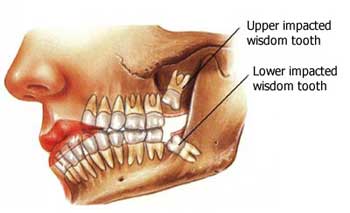Is it wise to remove wisdom teeth

December 2, 2015
Although wisdom teeth extractions are being recommended by medical professionals around the world as measures both preventive and responsive, patient discretion is recommended regarding extractions, as many voices have pointed out that the modern “better safe than sorry” approach is leading to the removal of even relatively healthy, disease-free wisdom teeth.
Recent years have seen a revival of the idea that patients must not simply say “yes” to every recommendation their doctors make, but instead be considerate about whether the recommendation is truly necessary for them by asking questions and becoming better informed. With this revival, the necessity of wisdom teeth extractions, one of the most widespread surgical procedures performed on patients, naturally became heavily questioned.
Wisdom teeth are a third set of molars that generally erupt between the late teens and early adulthood. For many, they do not grow properly, most times at awkward angles, facilitating infections, teeth crowding, and other problems. Annually, it is estimated that over ten million wisdom teeth are extracted from over five million patients. And because extractions have been recommended and conducted so routinely, they have become established as a rite of passage for teens and adults (WebMD).
In a 2007 report, however, dentist Jay Friedman, one of the strong advocates against routine wisdom teeth extraction, stated that his professional opinion was that only around thirty percent of extractions done yearly are truly necessary, and spoke against the preventative removal of wisdom teeth (USA Today).
Oral surgeon Thomas Dodson stated on a separate occasion that immediate surgery might not be the best option for all wisdom teeth cases, as one in twenty patients whose wisdom teeth are removed end up with infections, one in hundred with excessive bleeding, and another one in hundred with nerve damage (USA Today).
This may mean that millions around the world are needlessly undergoing surgery to remove wisdom teeth that are perfectly healthy.
Medical professionals around he world, and especially in the United States have risen up to speak on the subject, leading to the American Public Health Association adopting a policy that discourages preventative wisdom teeth extraction.
Periodontist Richard Niederman is in agreement; he recommends that medical professionals, upon offering advice about wisdom teeth-related procedures, focus on the current health of the patient rather than make speculative predictions that may be incorrect. “If the tooth is not diseased, leave it in. If it is diseased, then consider taking it out,” he said (LA Times).
Signs of diseased or potentially disease-facilitating wisdom teeth include: damage to surrounding teeth and/or jaw, sinus issues, gum inflammation, cavities, and alignment issues (WebMD).

Terrance • Aug 6, 2019 at 11:05 pm
Your wisdom teeth are important, but unfortunately, they can cause problems as you get older. When misaligned they can cause pain, swelling, stiffness, and infection. Your dentist may recommend having them taken out before they start to cause problems.:- Dental Clinic Near You